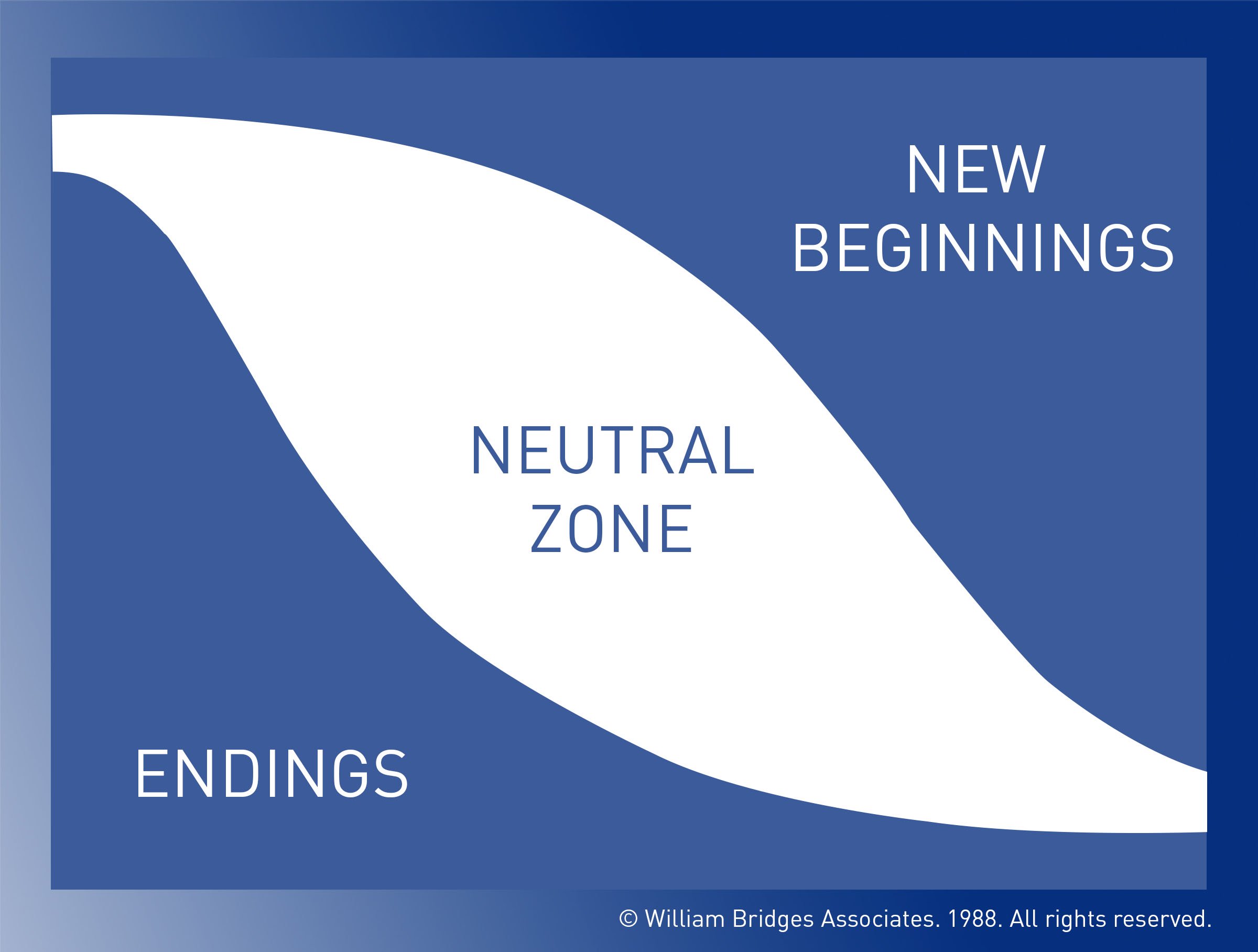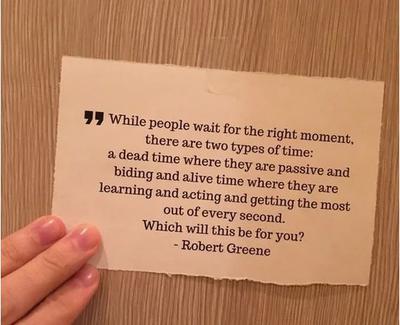Recognising Limbo As A Stage Of Transition
Limbo is transformed when you use it as an opportunity to do what you've long needed to do
Limbo was first recorded in the 14th Century and referred to as a place bordering on hell.
Quite frankly that's not a bad definition as that is exactly how it can feel when you are in an uncertain situation that you cannot control and in which you can see no progress or improvement - for a long time.
It's a feeling of being stuck and it can be the cause of intense frustration and feelings of hopelessness, misery and despair. I know because I am there now, and have been in limbo for a long time.
Limbo - Change and Transition
Limbo occurs at times of change. A change has occurred and quite likely been imposed upon you. You have experienced losses. The future is uncertain.
There is a useful model called "Bridges Transition Model" that describes what is happening to you and offers practical suggestions as to how to deal with it.
Whilst this model is drawn from the world of organisational change, its basic ideas are applicable to personal change.
One of the core principles of this model is that it draws an important distinction between the external circumstances of change and the personal internal journey.
The external change can be a life event such as the loss of a loved one, loss of a job and an income, it can be societal change such as we are currently experiencing during the coronavirus pandemic, or an international and political change as experienced by refugees and asylum seekers [as illustrated in the picture above].
Limbo Is A Stage Of Transition
The internal impacts of this external change are the psychological and emotional impacts, adjustments and changes that we experience when we experience significant change.
In the Bridges Transition Model these impacts are collectively referred to as transition.
The Psychological and Emotional Transition Is A Three Stage Process
This short video clip illustrates what is taking place in the transition process outlined in the Bridges Transition Model:
Dealing With Limbo
Here’s a question for you
“When you
can’t work because you have no work, when you feel stuck and can see no
way out of this situation, when you don’t even know if there is an end
of the tunnel, what do you do with your time?”
I find myself
facing this question in late March 2020 as my business dried up, the
emails and calls slowed down to a trickle and then stopped, my travel
plans were thwarted and I found myself with nothing to do, nowhere to
go, nothing to look forward, and very little hope for the future.
It
became very clear that I could either sit around moping and filling
this time with distractions to block out my irritation and frustration
or maybe I could transform this dead time into something constructive.
Alive Time vs. Dead Time
The phrase “Alive time vs. Dead time” was coined by popular author Robert Green and it has been popularized by blogger and writer Ryan Holiday.
“Dead time” is defined as time spent passively waiting around killing time in limbo until better times arrive.
Whereas, “Alive-time” is time spent consciously and constructively learning, growing, developing and growing.
Ryan Holiday, in interview with Robert Green, shares what this means in practice:
This Feels Like Prison To Me
I recall
years ago when I was a boy wondering how I would cope if I was ever put
in prison at some point if my future life. I always thought that if I
was unfortunate enough to have this happen to me, I would – if possible –
use the time to study, read and write.
Well, I don’t know about
you, but the global impact of corona-virus and the travel restriction
that as 2021 closes are still in place - all this feels like prison to
me…
So returning to late March 2020, I reflected deeply on all this and it came to me that I needed a project,
something constructive to do with my time, something that would be good
for me and hopefully useful for a few other people as well. So I
launched into writing a series of 30 articles for this website, based on
personal reflections and insights which I wrote at a rate of about 3 a week over a couple of months.
Since
then, I decided to expand the project and tackle a range of subjects I
have been avoiding tackling because they were “too difficult” or would
take too much time.
I now have the time – all the time
in the world - and I have researched and produced a wider range of
material on thinking skills, a critical evaluation of the law of attraction, I have also had a stab at writing about consciousness and overall I have now added about 200 pages of new content.
Rather
than treating this as a chore and something that supposedly would be
good for my soul but otherwise a grind (which frankly writing can be),
to my surprise I am finding this process educative and personally
helpful, and naturally I hope that visitors to this site are finding
something useful in these articles as well.
Reaching Out And The Karma Bank
But
in addition to the introspection of researching and writing, I am a
social animal and I have been desperately missing the personal contact
and connection during this extended period of lock-down.
I have
stumbled over a constructive way of channeling my frustrations into a
productive outlet. Various friends, family members, and business
associates have contacted me asking for my advice or opinion and I spend
a lot of time business mentoring, reviewing business proposals, and
helping people write CVs.
Sure, I would have tried to help in
these areas in the past, but now, having the time to do it, I treat each
and every one of these situations as a though it was well paid
consultancy gig and give it my very best attention.
I see this as opportunities to “put a deposit in the karma bank”.
Further Reading: Will You Choose Alive Time Or Dead Time?
Next Article: On Becoming The Ferryman
Return from "Limbo As A Stage Of Transition" to: Walking The Talk
LATEST ARTICLES
Dealing With Distraction - Learning How To Live With Your "Attention Autopilot"
 Living With Your Attention Autopilot The good news about your Attention Autopilot is that it will keep you safe. It is continuously scanning your immediate environment for threats. The bad news is tha…
Living With Your Attention Autopilot The good news about your Attention Autopilot is that it will keep you safe. It is continuously scanning your immediate environment for threats. The bad news is tha…The Time Of Your Life - Recognising Moments Of Alignment For Action
 How will you recognise your moment of alignment for action? In this article I want to look at our relationship with time and in the context of the two main themes of this site, firstly as a thinking s…
How will you recognise your moment of alignment for action? In this article I want to look at our relationship with time and in the context of the two main themes of this site, firstly as a thinking s…The Metagame Approach to Second Order Thinking - 5 Guiding Principles
 How To Position Yourself For Survival & Success In A Complex Environment We treat life as though it is a complicated system, and our thinking skills and mental models are focused on understanding its…
How To Position Yourself For Survival & Success In A Complex Environment We treat life as though it is a complicated system, and our thinking skills and mental models are focused on understanding its…Outcome Over Optics - Long Game Outcomes Over Short-Term Ego Gains
 The Day I Learned To Focus On Outcome Over Optics I have never forgotten the day I learned to focus on outcomes over optics and figured out a very simple way of saving myself several hundred thousand…
The Day I Learned To Focus On Outcome Over Optics I have never forgotten the day I learned to focus on outcomes over optics and figured out a very simple way of saving myself several hundred thousand…The ETTO Principle - Why Near Enough Can Be Good Enough
 How To Balance the Efficiency-Thoroughness Trade Off The ETTO Principle describes the inherent trade-off between working efficiently and working thoroughly. This trade-off is something that affects…
How To Balance the Efficiency-Thoroughness Trade Off The ETTO Principle describes the inherent trade-off between working efficiently and working thoroughly. This trade-off is something that affects…Master The Art Of Drawing The Bow
 Focus On Process Not Outcome In so many areas of our lives, we focus on the outcome, not the process that we follow to achieve it. In the western world, we are conditioned to pay less attention to how…
Focus On Process Not Outcome In so many areas of our lives, we focus on the outcome, not the process that we follow to achieve it. In the western world, we are conditioned to pay less attention to how…And So This Is Christmas
 There Is No Path To Peace - The Path Is Peace Thich Nhat Hanh, the renowned Vietnamese Zen Buddhist monk, teacher, and peace activist, often spoke about peace as a state of being that begins within on…
There Is No Path To Peace - The Path Is Peace Thich Nhat Hanh, the renowned Vietnamese Zen Buddhist monk, teacher, and peace activist, often spoke about peace as a state of being that begins within on…Curiosity Skilled The Cat - Optimize For Interesting
 Curiosity Fuels Excellence The old adage, “Curiosity killed the cat,” warns of the dangers of venturing too far into the unknown. But what if we reimagine it not as a risk but as a gateway to developi…
Curiosity Fuels Excellence The old adage, “Curiosity killed the cat,” warns of the dangers of venturing too far into the unknown. But what if we reimagine it not as a risk but as a gateway to developi…Let Stillness Speak - Living Within A Complex System
 To let stlllness speak is to learn it's first major lesson: you are not your thoughts. To let stillness speak is about stepping back from the constant chatter of your mind and allowing a deeper, quiet…
To let stlllness speak is to learn it's first major lesson: you are not your thoughts. To let stillness speak is about stepping back from the constant chatter of your mind and allowing a deeper, quiet…Understanding Complex Systems Thinking - It's Not Complicated
 Understanding, and being able to work with, complexity is an important thinking skill.
We are all working with complex systems, and we do so every day. The biggest one is life itself. We automaticall…
Understanding, and being able to work with, complexity is an important thinking skill.
We are all working with complex systems, and we do so every day. The biggest one is life itself. We automaticall…Stay On The Bus - When To Keep On Going
 The Helsinki Bus Station Theory
Have you ever started a new project, initiative or role with a big vision and a determination to make a difference? Initially you were full of enthusiasm and highly mo…
The Helsinki Bus Station Theory
Have you ever started a new project, initiative or role with a big vision and a determination to make a difference? Initially you were full of enthusiasm and highly mo…Zen Thoughts Email Series
 Conversations With A Friend Zen Thoughts is an email series of 50 short messages spread over 3 months. The messages are written in the style of a conversation with a friend who is going through a toug…
Conversations With A Friend Zen Thoughts is an email series of 50 short messages spread over 3 months. The messages are written in the style of a conversation with a friend who is going through a toug…How to Get What You Value by Changing What You Measure
 Give Up Control & Gain Influence To Get What You Want
The metrics we choose to focus on can significantly shape our outcomes, sometimes in ways we don't intend. The challenge is to make sure that you…
Give Up Control & Gain Influence To Get What You Want
The metrics we choose to focus on can significantly shape our outcomes, sometimes in ways we don't intend. The challenge is to make sure that you…How to Become A Master At Overcoming Hard Moments
 "The best in the world are not the best because they win every point. It's because they lose again and again and have learned how to deal with it." This quote from Roger Federer has got a lot of cover…
"The best in the world are not the best because they win every point. It's because they lose again and again and have learned how to deal with it." This quote from Roger Federer has got a lot of cover…Drop The Story - Deal With Your Demons and Transform Your Experience
 Are you living your life from the stories you tell yourself? Learning how to drop the story and deal with that voice in your head can be a game changer. When you can do this you will have a powerful t…
Are you living your life from the stories you tell yourself? Learning how to drop the story and deal with that voice in your head can be a game changer. When you can do this you will have a powerful t…



